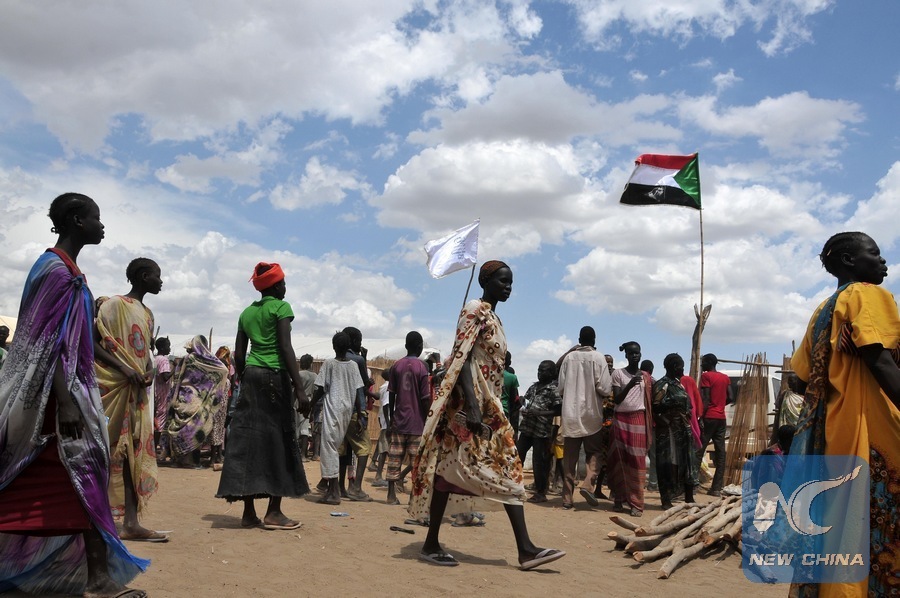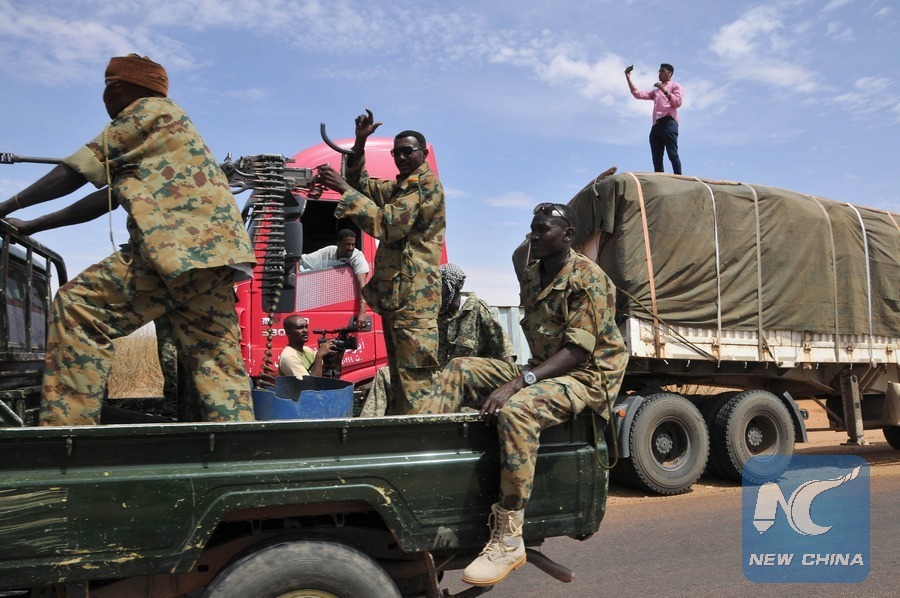
Refugees from South Sudan wait to be settled outside the Khour Al-Waral refugee camp in Al-Salam locality, some 69-kilometers south of Rebek, capital of White Nile State, Sudan, May 18, 2017. The Khour Al-Waral refugee camp accommodated 50,000 refugees. The majority of them are from Upper Nile State of South Sudan on the border with Sudan. (Xinhua/Mohamed Babiker)
JUBA, May 25 (Xinhua) -- Heads of two UN agencies have called on South Sudan's warring parties to the conflict to cease violence and work together to ensure that food and other lifesaving support can reach people to end famine and severe hunger.
The Food and Agriculture Organization (FAO)'s José Graziano da Silva and World Food Programme (WFP)'s David Beasley stressed in a joint statement issued in Juba that an immediate, massive response is critical, combining emergency food assistance and support for agriculture, livestock and fisheries.
"Despite the appalling conditions, it is not too late to save more people from dying. We can still avoid a worsening of the disaster, but the fighting has to stop now," said FAO Director-General Graziano da Silva during a visit to the former Unity State, one of the areas in South Sudan worst hit by the current hunger crisis.
"There can be no progress without peace. People must be given immediate access to food, and farmers need to be allowed to work on their fields and tend to their livestock," he added.
According to the UN, about 5.5 million people in South Sudan, or almost half the population, face severe hunger, not knowing where their next meal is coming from ahead of the lean season, which peaks in July.
Of these, around one million people are on the brink of famine. Of those 5.5 million, more than 90,000 South Sudanese face starvation with famine declared in parts of former Unity State.
"This unprecedented situation reflects the impact of ongoing strife, obstacles to delivering humanitarian assistance and declining agricultural production," the agencies said.
In the former Unity State, Graziano da Silva and WFP Executive Director Beasley visited people in several places who are being supported by the two agencies as they cope with the hunger crisis.
They met with people facing famine on the remote Kok Island, a refuge in the Nile River where many people have sought shelter from fighting.

Security members escort the convoys carrying food materials through the humanitarian corridor from Sudan's El Obied to Bentiu in Bahr el Ghazal State of South Soudan, May 19, 2017. The humanitarian corridors recently opened by Sudan government have contributed to the delivery of humanitarian aid to South Sudanese citizens and to lessening the famine there, according to aid organizations. (Xinhua/Mohamed Babiker)
They witnessed WFP planes airdropping lifesaving food for tens of thousands of people in Ganyiel, where regular distributions of humanitarian aid have kept famine at bay.
The two agency heads saw aid workers from international and local partner organizations distributing WFP food and nutrition treatments, as well as seeds and fishing kits from FAO.
"Food, treatment for malnourished kids, kits that help people fish and grow vegetables - these are the difference between life and death for people we met in Unity state," Beasley said.
"But we can't keep scaling up forever. The fighting has to end to make the kind of investments that give the children of South Sudan any hope for the future they deserve," he said.
The two UN agencies face a funding gap of around 182 million U.S. dollars for the next six months, and are struggling to raise funds to meet skyrocketing needs in several crises around the world.
"Donors have supported South Sudan over many years," said Beasley said, noting that WFP will continue to stand by the people of South Sudan in their time of need.
"But times are tight, with so many crises around the world demanding attention and support. South Sudan's leaders must show good faith by facilitating humanitarian efforts, including getting rid of unnecessary fees and procedures that delay and hinder aid," he said.
WFP aims to assist at least 4.1 million people this year in South Sudan, including lifesaving food for people in remote areas who would otherwise have practically nothing to eat, as they have been cut off by fighting.
The two UN agency heads also visited an FAO project aiming to provide women farmers and pastoralists with a place to safely process milk for their families and to sell it. It also offers a space for community training.
They stressed the need for the international community to further support the humanitarian efforts in South Sudan.

